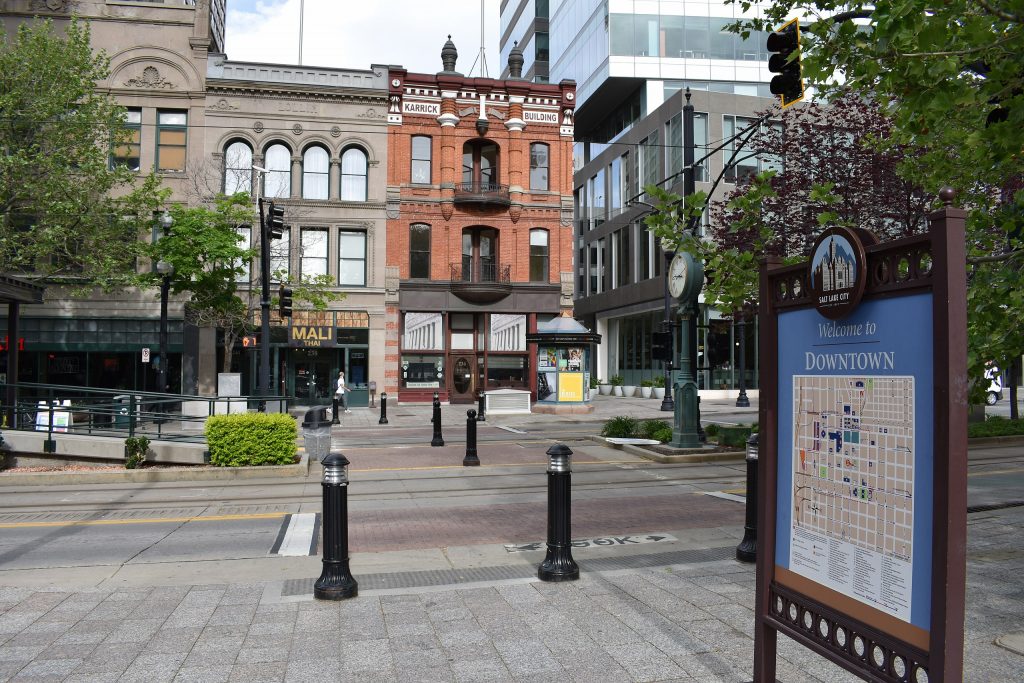Salt Lake City Had Nation’s Best Pandemic Recovery
All the city news you can use.

Main Street in Salt Lake City. Photo by Tamanoeconomico, (CC BY-SA 4.0), via Wikimedia Commons
Every day at The Overhead Wire we sort through over 1,500 news items about cities and share the best ones with our email list. At the end of the week, we take some of the most popular stories and share them with Urban Milwaukee readers. They are national (or international) links, sometimes entertaining and sometimes absurd, but hopefully useful.
Emerging project agreements: A new federal program is looking to counter a disconnect in how local projects in different economic sectors can be coordinated locally as they receive federal funding. So to maximize impact from a portfolio of separate projects that are receiving federal funding, places like Austin and Kansas City are using a new tool called an Emerging Project Agreement that connects USDOT and the Build America Bureau to local project sponsors. (Bruce Katz | The Philadelphia Citizen)
Colorado governor looks for solutions: After a failed bid to fix land use in the state last legislative session, Colorado Governor Jared Polis is floating an idea to increase transit service and link it to housing and climate action. But the governor also believes the transit agency serving the Denver Region, RTD, is in need of an overhaul and before they receive more funding. The agency is running just 70% of 2019 service and the governor is open to changing the State DOT’s priorities to get more. (Colorado Public Radio)
Salt Lake City’s downtown success: A report from the University of Toronto found that Salt Lake City had the best pandemic recovery of any downtown in the United States. Coupled with workers who see being in the office as important to growth is a focus on cultural institutions and entertainment that make up a greater part of the city’s footprint than many office dominated places. Last year 61% of people came downtown for arts and entertainment. (Alan Greenblatt | Governing)
Stopping Jakarta from sinking: Jakarta Indonesia is sinking into the sea as groundwater is extracted for drinking and the threat of sea level rise increases. The city’s only hope of salvation is setting up the ability of residents to get drinking water through pipes and not wells, which are used by 1 in 3 people in the megacity. That task now falls on a noodle billionaire who’s company has just been awarded the contract to get people off wells. (Sheryl Tian Tong Lee and Grace Sihombing | Bloomberg CityLab)
Quote of the Week
What we’re seeing is that a growing number of folks are reaching out because they’re looking for a better option in their community. They’re really looking for autonomy over where their food comes from and the ability to have the kind of food they want to have.
–Faye Mack, executive director of the Food Co-op Initiative in Fast Company discussing interest in co-ops after dollar stores have pushed out local groceries.
This week on the podcast, we’re at the Mpact conference in Phoenix with Tom Brennan, senior principal at Nelson Nygaard. Tom and I talk about the sexy world of bus speed and reliability, how agency can invest for effectiveness, and future proofing routes for the long term.
Want more links to read? Visit The Overhead Wire and signup.
If you think stories like this are important, become a member of Urban Milwaukee and help support real, independent journalism. Plus you get some cool added benefits.
Urban Reads
-
Congestion Pricing Cuts Air Pollution in New York City
 Dec 14th, 2025 by Jeff Wood
Dec 14th, 2025 by Jeff Wood
-
We Think We Love to Drive. But Do We Really?
 Dec 7th, 2025 by Jeff Wood
Dec 7th, 2025 by Jeff Wood
-
Can Scott Wiener Tackle America’s Housing Crisis?
 Nov 23rd, 2025 by Jeff Wood
Nov 23rd, 2025 by Jeff Wood





















